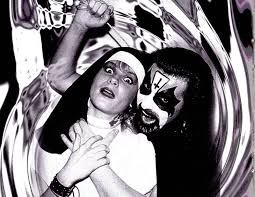
With our friends in Sweden and Belgium tantalising us with tales of KING DIAMOND‘s recent European Festival tour and the fact that ‘MELISSA’ is rarely off our stereo in the run up to its 30th Anniversary this Autumn, we knew that we wanted to interview the King of all evil. We sent GREG MOFFITT off for a dangerous meeting with the man himself to talk about his whole career from BLACK ROSE to BLOODSTOCK and most importantly the fate of MERCYFUL FATE…
How and when did you first get into music?
“I had a little transistor radio with a cassette deck built in and I used to listen to rock programmes in the afternoon and record some of the songs. Then I saved up from my allowance and eventually got a reel to reel tape machine, which was great because I could even record from the TV with that! Then in ’71 I got my first turntable, which I could plug into the reel to reel machine. That was stereo and that was a big deal! The first three vinyl albums I bought were Deep Purple’s ‘Fireball’, Black Sabbath’s ‘Master Of Reality’ and Jethro Tull’s ‘Aqualung’. Obviously I’d already heard ‘Paranoid’ and ‘Black Sabbath’ and ‘In Rock’ by Purple and all that stuff, but those were the first ones I actually bought.”
At what point did you actually start making music yourself?
“The urge to create sound myself came mainly from Jimmy Page’s guitar. I got the first Led Zeppelin album and I was like ‘Man, I would love to create that raw guitar sound!’ So I saved up again and got my first guitar, which was a lousy copy of an Explorer. When I got it home I was surprised that it didn’t sound like Jimmy Page. A family friend told me that I needed an amp – I was so ignorant about the whole thing! But he was an electronics engineer so he built one for me. It had a red ‘on’ and ‘off’ button and a black button that was always on as it created the distortion! The local library had some rehearsal rooms in the cellar and that’s where I started my first band with some friends. We called ourselves Brainstorm.”
You later joined local band Black Rose, which is where you began to develop a theatrical stage act and your unique vocal style. How did that come about?
“I only played guitar in Brainstorm and when that stopped I was looking for another band to play guitar in. Then I saw an ad at a grocery store that Black Rose were looking for a vocalist. So I went over and tried to sneak in as a guitarist/vocalist although I’d never sung before in my life. But they said ‘Nah, we don’t need a guitarist’. Their guitarist was a huge [Ritchie] Blackmore fanatic and he really had it down. So I just gave it a shot! The first song we did was [Deep Purple’s] ‘Space Truckin’’ and I just screamed and hoped they liked some of it and they did! As time went on, I learned not to scream so much and actually found that my stomach muscles could control airflow and I didn’t have to put crazy pressure on my throat; I would come home from rehearsals with no voice left! Later, a guy came up to me at a show and said ‘You should use your falsetto a bit more’. I had no idea what he meant. He said ‘When you sing high it sounds really good!’ so I put effort into trying to improve and you can hear the first steps on the Black Rose CD.”
Why did Black Rose split up?
“Black Rose actually stopped because the keyboard player sold his keyboards to get his girlfriend a new kitchen.”
You then joined another Danish band, the punk/metal outfit Brats, which is where you first met future Mercyful Fate guitarist Hank Shermann.
“Black Rose had started playing clubs in Copenhagen and one of the club managers – who also worked at a record store I went to – knew both me and Hank who was with Brats. Brats had released one album through CBS in Denmark. They’d been told that they should get a singer instead of the bass player singing. This is when I came into the picture. The style changed; it became a lot heavier. But when CBS heard our demos they said ‘You can’t do this! You need to go back to the style we signed you for!’ There was a split in the band right there, so Hank and I went the way of doing what we felt inside. The rest of the band tried to please the label in order to keep the deal, but it didn’t work.”
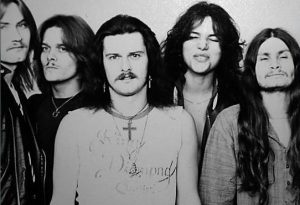 It was around this time that you also met your other future Mercyful Fate band mates Michael Denner and Timi Hansen.
It was around this time that you also met your other future Mercyful Fate band mates Michael Denner and Timi Hansen.
“Michael Denner had a three-piece band called Danger Zone with Timi Hansen on bass. Michael asked Hank if he and I could come over and help with a demo he was doing. The drummer wasn’t really what we were after, but otherwise it worked really well. This then turned into Mercyful Fate, the name coming from somebody’s girlfriend at the time, although we changed the spelling to make it kinda like Old English I guess.”
In 1982, Mercyful Fate made its first appearance on vinyl with ‘Black Funeral’, which was the first track on Ebony records’ second metal compilation ‘Metallic Storm’.
“That’s right, it was off to Hull to record in that tiny, tiny demo studio! We recorded two songs and one appeared on the album. After that came out, interest really grew and we were invited to go and do the BBC Friday Rock Show. We did three tracks and they got such a great response that they were re-broadcast and came to the attention of Rave On Records who wanted us to go down to Holland and record an EP. That was a real turning point.”
This was the self-titled EP, often referred to as ‘Nuns Have No Fun’, which also came out in ’82. How were the studio sessions for that?
“Me and the guitarists had all these harmonies worked out but there was no time to do most of them. It was the same with the guitar solos. ‘Corpse Without Soul’ had a long intro solo and we’d done two takes and still weren’t satisfied. But it was like ‘Whatever you do next, that goes on the album!’ Talk about pressure! When Roadrunner came in a little later and offered us eight days to record ‘Melissa’, we were like ‘Oh my god! Now we can do all the things we had planned last time!’ Then for ‘Don’t Break The Oath’ we got 12 days! But the EP did a lot of good for us. It was exported to a lot of different countries; I know Lars Ulrich and Brian Slagel [Metal Blade boss] heard it together at Brian’s place.”
Mercyful Fate were really beginning to gain some traction when the band suddenly split in 1985. What happened?
“We grew apart with the musical style. Hank was hanging out with a lotta people from the funk scene and he wanted to try and bring those influences into the band. I could listen to some of that, but I would never dream of playing it because I didn’t feel it inside. I’ve never done anything I couldn’t stand 100 per cent behind. I’d rather stop than do something I was forced to do by someone else. Plus I had already started writing stuff like ‘The Candle’, which was meant to be on the third Mercyful Fate album. But we did the right thing and followed our heart. And of course Hank has come back to being completely metal now!”
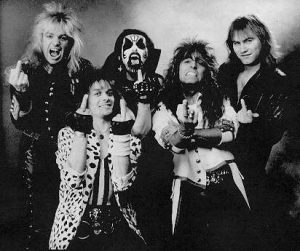 At this point King Diamond the band was born. How did that happen?
At this point King Diamond the band was born. How did that happen?
“I approached Michael and Timi and said ‘I know you guys are on the same page with the music, so do you wanna continue this?’ They agreed right away and it was just a matter of finding some other musicians. Michael knew [drummer] Mikkey Dee who was living in Denmark at the time. We had a second guitarist lined up but he didn’t learn his parts. He was given several warnings – ‘If you don’t have this down, don’t bother coming to the studio’. But he was too much party, too little guitar, so we went into the studio as a four-piece. We’d done all the rhythm guitar tracks when we came across Andy [LaRocque]. He flew down to Copenhagen and we gave him ‘Dressed In White’ as a test song to see what he could come up with. Not just seeing if he could play, but testing his creativity right off the bat. He came in and laid down the solos that are actually on the album, so it was a pretty easy choice!”
If the first King Diamond album ‘Fatal Portrait’ was something of a transitional effort, the 1987 follow-up ‘Abigail’ heralded the arrival of the full-on King Diamond sound. Many people think it’s your best – do you agree?
“It was the first horror concept album from a metal band. For a lot of people, I guess that’s the album that made the biggest impression on them. After that, the albums were less hard-hitting because people knew our style and it was no longer a surprise. It was tough to match it, even though I think we have several times, and even surpassed it.”
Throughout the remainder of the decade, King Diamond enjoyed greater success with the albums ‘Them’ (1988), ‘Conspiracy’ (1989) and ‘The Eye’ (1990) than Mercyful Fate ever had. However, it’s also true to say that since disbanding, Mercyful Fate’s cult following continued to grow, so much so that you reformed for the release of 1993’s ‘In The Shadows’. This subsequently led to the release of a further four Mercyful Fate albums between 1994 and 1999, much more music than your original incarnation. How do you think they compare?
“Some are better than others, but there are often circumstances that keep you from achieving your goals. The last one, ‘9’, really hit the spot. There’s some really cool stuff there. ‘In The Shadows’ was also really good. ‘Time’ has good songs, but perhaps not consistently great. King Diamond is extremely theatrical and the songs are made to fit the story lines whereas Mercyful Fate is all individual songs, which can be harder to write because you don’t have as much time to explain things or get into bigger subjects. So, in a way, King Diamond is way more ‘Satanic’ than Merycful Fate will ever be, which might sound twisted, but the way I look at it ‘Satanic’ means LaVeyan, and the King Diamond horror songs are full of that life philosophy to the max.”
Will there ever be another Mercyful Fate album?
“There’s still room for both bands and I know Hank would love to do at least one more. He’s often said to me ‘Someday, we have to do the masterpiece!’ He doesn’t feel that we did the perfect one that should have followed ‘Don’t Break The Oath’. Well, I will never say never, but right now we are too busy with King Diamond.”
You mentioned Satanism. This is something you’ve caught a lot of flak for over the years, mainly because you’ve been misunderstood, and sometimes deliberately misrepresented.
“Satanism is a life philosophy; it has nothing to do with religion. Almost from day one, Christianity created evil ‘gods’ within itself. Satan is a Christian creation and was used to get power, especially in the past. How many people died in the Inquisition because of things that were made up? In general, you find misuse of power within religions. It’s a big part of all these wars today. They will not respect each other, and yet there has never been anyone on this Earth who could prove to the rest of humanity that theirs was the only true god. There might be people who feel that they personally have been given proof, but they have to understand that you can’t condemn everyone else. For me, I think it’s important to respect other people no matter what they believe. And I would never stand up and say ‘There are no gods!’ How would I prove that?”
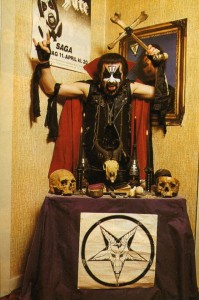 You also mentioned LaVey, as in the late Anton LaVey, former head of The Church Of Satan. By all accounts he was quite a character, whom you met more than once.
You also mentioned LaVey, as in the late Anton LaVey, former head of The Church Of Satan. By all accounts he was quite a character, whom you met more than once.
“I was very close to LaVey for a while – I dated one of his daughters actually. He was very serious about what he wrote in ‘The Satanic Bible’. He managed to put into a book what I had always felt. It’s not like I read the book and said ‘I wanna be like that!’ I recognised myself in his writing.
“Once I was invited to come to the Church and spend a whole night there. I spent two hours in the ritual chamber with him. It had been re-energising for over a year and a half and no one had been in there except him. There was a very high altar, a sleigh from a Russian Czar who had used it to drive his witches to and from court; there were original books – all kinds of stuff in there. There were 13 rooms and he could enter all these rooms in full secrecy. There was an iron maiden, which was actually a doorway from another room. It was an amazing experience. Instead of me just going in there and waiting for him to speak, I told him that I would like to speak first and tell him what I felt about the Satanic philosophy. I spoke for about 45 minutes after which he took his Baphomet sigil off and pressed it into my hand; it just said everything. Then we talked for about an hour and a half. He played keyboards for me that night – could’ve been music for a horror movie – and then suddenly he switched into ‘Wonderful Copenhagen’, looking over his shoulder with a big smirk on his face! With his humour and just the way he was, there was a very deep connection.
“I have a hand-written letter from him, which I always carry with me. It means so much to me as he never wrote anyone by hand, he would always dictate. I told Karla LaVey that I had this letter from her dad and she didn’t believe it, so I showed it to her and she started crying when she saw what he’d written to me. He said that everything was going according to plan. I know exactly what he’s talking about, but I will never tell anyone.”
What did you make of the murders and church burnings in the Scandinavian black metal scene of the early ‘90s? Many of the protagonists cited you as an influence.
“I don’t really know the background to it and I didn’t really follow who did what and what for. I don’t know what their murder rate was, but people get killed every day. Some things get blown out of proportion because of what you can pin on them. It was big for the people involved, but should it have been made into such a big news story? But it was because of the ‘Satanic’ thing. I actually wish that ‘The Satanic Bible’ had been called something else because people think it must be a book about some kind of religion. Supernatural happenings and ritual powers are mentioned in there, but nothing that constitutes a religion.”
In 2010, you were diagnosed with major heart problems and had to undergo triple-bypass surgery. It sounded horrendous, particularly the point at which you were technically dead for a couple of hours.
“It was some brutal shit! They had to puncture my lungs to have room to do the operation, so I literally had to learn to breathe again. It hurt like hell and I can’t even begin to describe it to you. Every breath was a fight from the beginning, so I had to learn to breathe in a different way. Everything sits differently in my chest now and I have a big braided metal rod down the middle – it looks like a piece of jewelry on the x-rays. There’s still pain and it’ll be here for a long time, but you can learn to live with it.
“For the first few months afterwards I was more concerned with thinking that I wasn’t really here. About three months went by before I stopped asking my wife if she could see me or feel when I touched her shoulder and stuff like that. There was so much horror in the wake-up process that must come out on the next album. Not writing about a hospital stay, but the moods and the feelings of struggling for every breath and the pain of being on a ventilator. If the doctors could have heard me I would have begged them to kill me. It was fuckin’ brutal and an eye-opening experience for sure. But if I lived in a house with 20 windows before, I live in one with 40 windows now. I see so much more and pay attention so much more.”
Ironically, you’re singing better than ever now.
“My voice is better than it’s ever been since I stopped smoking. The long and high notes are easier. If I’d known that before, I’d have stopped smoking a long time ago! I’m also on a very healthy diet and I walk five times a week. It’s all a matter of good fats / bad fats, good cholesterol / bad cholesterol. My wife’s basically become a nutritionist. She’ll sit and tell me ‘Oh that’s great, you can eat that’ and if she says it’s okay, I’ll eat it. She could kill me off in a second if she wanted to!”
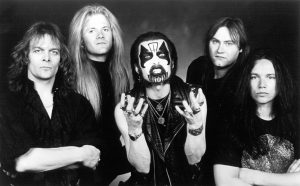 As the decades have gone by, your legacy with both Mercyful Fate and King Diamond has grown immensely in its importance. Not only do the likes of Metallica and Slayer openly acknowledge their debt to you, but today’s underground metal scene is awash with worshippers, some more blatant than others. Have you heard Portrait or In Solitude for example?
As the decades have gone by, your legacy with both Mercyful Fate and King Diamond has grown immensely in its importance. Not only do the likes of Metallica and Slayer openly acknowledge their debt to you, but today’s underground metal scene is awash with worshippers, some more blatant than others. Have you heard Portrait or In Solitude for example?
“It’s a huge honour of course. When Metallica invited me up to play the Mercyful Fate medley and said that without me there probably wouldn’t be a Metallica – are you kidding me? That’s practically the highest honour you can be given. I always wanted to do my own thing, and you don’t hear King Diamond and wonder if it’s really us or someone else. Others should not try to sound like us – why would anyone do that? That would be a tribute band, so why not do your own thing? I don’t think anyone has gone so far as to mimic what we do. I heard part of one of Portrait’s albums. I could hear what the singer was trying, but I don’t think he sounds like me. But whether it’s the show, the music or the lyrics, there are so many things that could trigger someone else artistically to go out and try their own thing.”
Downloading has torpedoed physical music sales across the board, but in terms of audience size, King Diamond seems to be thriving.
“We’re doing better today than we’ve ever done. We’ve been getting some nice headline spots and making sure we don’t let people down. The show we have now is really unique and even better than the one we had last year. The order of the songs is better, the lighting is better; the production has really been perfected. When we played Copenhagen, one of the biggest national newspapers gave us six out of six. They actually tell their journalists not to give six as there is no such thing as a perfect concert, but we got it. Not even Metallica did that! And there’s room for progress in the future. If I look at King Diamond as a painting on a big canvas, there are still plenty of empty spots to be filled out.”
You’ve looked death in the face and lived to fight another day – has it changed you at all?
“I’ve always felt that I’m gonna experience the presence of my parents and my cats when I’m not here anymore. That doesn’t give me enough for religious belief but I’m convinced, even if I can’t prove it. When they were rolling me in for my seven-and-a-half hour operation, I realised there wasn’t time to say goodbye, in case it was necessary. So I just said to my wife ‘I wanna come back to you, I’m not done yet, so I’ll do everything I can to survive, and you do everything you can to help me’. Who knows if any powers were at work, but we feel that they were. There’s a saying that your thoughts can move mountains and there’s something to that, but never take tomorrow for granted.”
Originally printed in Iron Fist #6
Copyright © 2024 Iron Fist Magazine. All Rights Reserved.